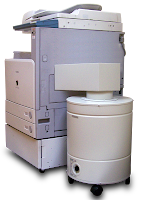 |
| Mold exposure can trigger asthma, allergic reactions and more problems. |
Schools should be proactive in their moisture control practices, which are the key to controlling indoor mold growth.
Molds are a major source of indoor allergens and can trigger asthma in sensitive individuals.
Even when spores are dead or unable to grow, mold can cause health effects, such as allergic reactions.
The types and severity of health effects associated with exposure to mold depend, in part, on the type of mold present and the extent of the occupants’ exposure and existing sensitivities or allergies.
Prompt and effective remediation of moisture problems is essential to minimize potential mold exposures and their potential health effects. These negative health effects can lead to increased absenteeism and reduced performance in both staff and students.
To learn more about how IAQ issues, including mold and moisture, can affect student and staff performance, visit http://epa.gov/iaq/schools/benefits.html.
How should mold be safely cleaned?
It is essential to clean up mold as well as excess water or moisture, because moisture is the key to mold control.
If the excess water or moisture problem is not fixed, mold will most likely grow again, even if the area is completely cleaned.
Clean hard surfaces with water and detergent and dry them quickly and completely.
Absorbent materials such as ceiling tiles may have to be discarded if the mold cannot be completely removed.
To clean up mold safely and effectively, staff should wear waterproof gloves during clean up and should not touch mold or moldy items with bare hands.
Respiratory protection should also be used in most remediation situations to prevent inhalation exposure to mold.
10 tips to control mold and moisture in schools this spring
- Establish a mold prevention and remediation plan within your greater IAQ management program.
- View the IAQ Reference Guide on Mold and Moisture for tips on identifying and correcting common mold and moisture issues.
- Inspect all school buildings for signs of mold, moisture, leaks or spills, or evidence of past water damage.
- Prevent moisture condensation by increasing surface temperature, installing proper insulation and improving air circulation.
- Eliminate sources of moisture by reducing indoor humidity; maintain indoor humidity levels between 30 and 60 percent.
- Respond promptly when you see signs of moisture and/or mold or when leaks or spills occur. Dry all wet areas within 24 to 48 hours.
- Perform regular heating, ventilation, and air conditioning (HVAC) inspections and maintenance as scheduled. Ensure HVAC drip pans are clean, unobstructed and flowing properly.
- Review EPA’s “Mold Remediation in Schools and Large Buildings” to learn about mold growth in schools and how it can be managed.
- Educate school community members, including teachers, school officials, and facilities and maintenance staff , on the importance of mold and moisture control.
- Review the Mold and Moisture: Double Trouble for Schools webinar presentation given by Peggy Caruso, IAQ Coordinator for Katy Independent School District in Texas and Todd Spore with PBK Architects. Learn cost-effective solutions to prevent and control mold and moisture, and find technical information about remediating mold or moisture intrusion.
Source: EPA
Take control of the air quality in your school
 |
| Electrocorp's RAP series are sturdy and effective air cleaners. |
Electrocorp's air cleaners for schools and universities remove a wide range of air pollutants with a deep-bed activated carbon filter and HEPA (plus optional UV to neutralize bacteria, viruses and mold spores).
Electrocorp is a trusted manufacturer for air cleaners in many universities and schools across North America.
Contact Electrocorp for more information: 1-866-667-0297 or write to sales@electrocorp.net.






